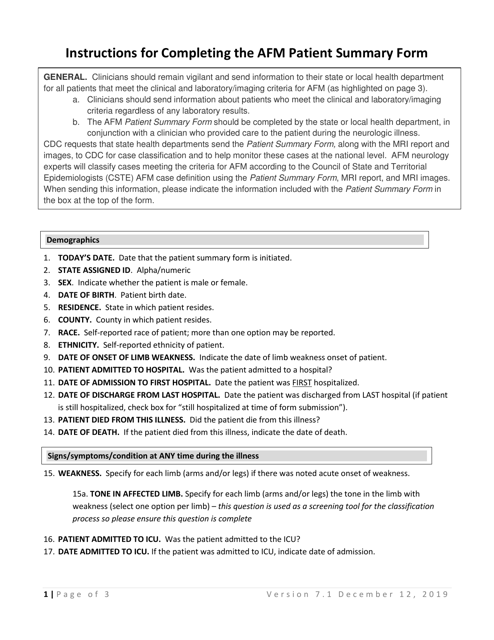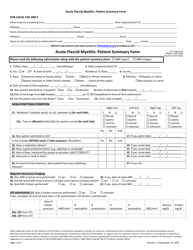Instructions for Acute Flaccid Myelitis: Patient Summary Form
This document contains official instructions for Acute Flaccid Myelitis: Patient Summary Form , a legal form released by the U.S. Department of Health and Human Services - Centers for Disease Control and Prevention. The up-to-date fillable form can be downloaded through this link.
FAQ
Q: What is Acute Flaccid Myelitis?
A: Acute Flaccid Myelitis is a rare neurological condition that affects the spinal cord.
Q: What are the symptoms of Acute Flaccid Myelitis?
A: Symptoms include sudden onset of limb weakness, decreased or absent reflexes, and facial drooping.
Q: How is Acute Flaccid Myelitis diagnosed?
A: AFM is diagnosed by a combination of clinical evaluation, medical history review, and tests such as MRI and cerebrospinal fluid analysis.
Q: What causes Acute Flaccid Myelitis?
A: The exact cause of AFM is unknown, but it may be linked to viral infections such as enteroviruses.
Q: How is Acute Flaccid Myelitis treated?
A: There is no specific treatment for AFM, but supportive care and ongoing rehabilitation can help manage symptoms.
Q: Can Acute Flaccid Myelitis be prevented?
A: Prevention is difficult, but practicing good hygiene, avoiding mosquito bites, and staying up to date with vaccinations can help reduce the risk.
Q: Is Acute Flaccid Myelitis contagious?
A: AFM is not believed to be contagious, but some of the viruses that may be associated with it can spread from person to person.
Q: Who is at risk of developing Acute Flaccid Myelitis?
A: AFM can affect people of all ages, but it mainly affects children.
Q: What should I do if I suspect Acute Flaccid Myelitis?
A: If you or someone you know is showing symptoms of AFM, seek medical attention immediately.
Q: Are there any ongoing research efforts for Acute Flaccid Myelitis?
A: Yes, researchers are actively studying AFM to better understand its causes, treatment options, and prevention strategies.
Instruction Details:
- These 5-page instructions are available for download in PDF;
- Released on December 12, 2019 - the latest version provided by the issuing department;
- Up-to-date, printable, and free to use.
Download your copy of the instructions by clicking the link below or browse more forms, instructions and templates in our online library.













